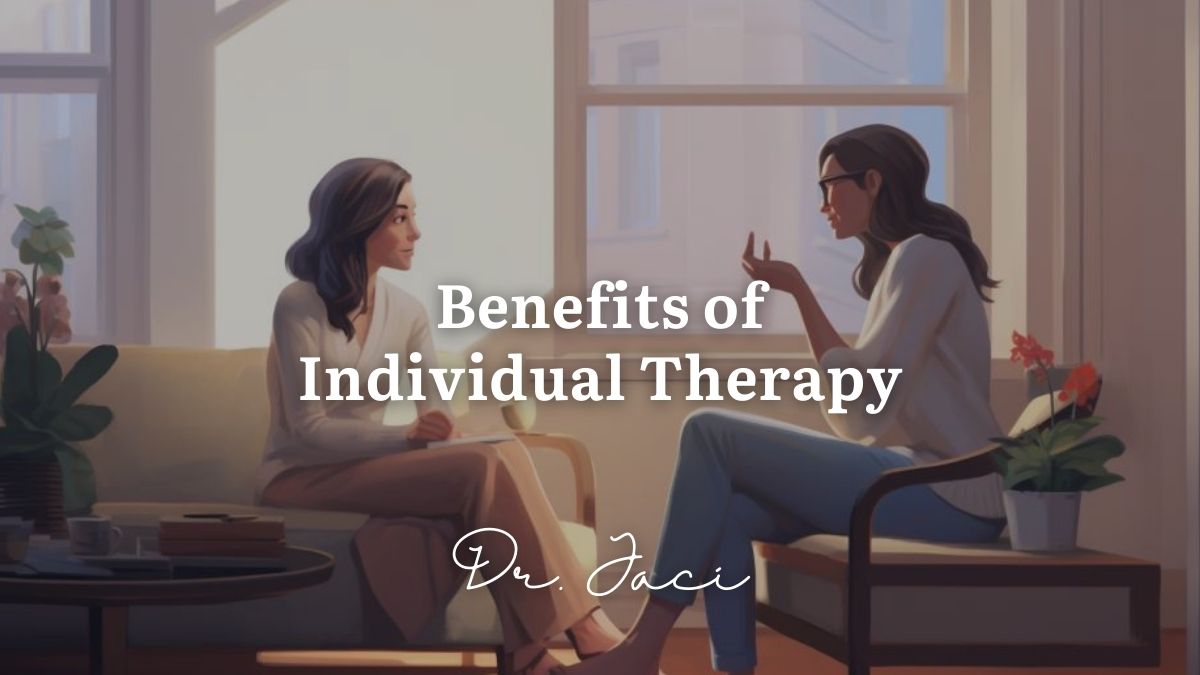If you’re thinking about talking to someone, it’s important to understand the benefits of individual therapy.
Therapy provides numerous advantages to individuals who seek help.
In this post, I will highlight some of the top benefits that emerge in the course of individual therapy.
Benefits of Individual Therapy
1. Personalized Attention
As a therapist, I have the privilege of guiding my clients through their healing journeys. I’ve found that one of the key elements that make this process so transformative is the personalized attention inherent in individual therapy.
It’s the art of tuning into the client’s unique world, understanding their distinct experiences and challenges, and tailoring the therapeutic approach accordingly.
Individual therapy is not a pre-packaged process; instead, it’s bespoke and designed to meet the individual’s unique needs and circumstances.
Related: What to Talk About With Your Therapist
This approach is grounded in the recognition that each person is a universe unto themselves, with distinct life experiences, personal challenges, and histories.
It’s the profound understanding that no two individuals are alike, and therefore, the approach to their healing should not be alike either.
Focused Care

My role as a therapist is to offer focused care – a therapeutic approach tailored to your individual circumstances.
It is a process that respects and values your personal journey and experiences and one that evolves as we continue our work together.
This personalized and focused care allows us to delve deeply into your specific issues, enabling us to explore and address the root causes of these challenges.
Focused care means your needs are the center of the therapeutic process, providing the space, time, and attention needed for meaningful growth and lasting healing.
Ultimately, individual therapy’s personalized approach offers a highly supportive environment, fostering growth, resilience, and self-awareness.
2. Safe Environment
Therapy provides a secure, confidential, and non-judgmental environment where individuals are free to express their feelings and thoughts.
A Haven for Emotional Expression
Individual therapy is essentially a haven of emotional safety. It’s a place where you can disclose your deepest feelings, fears, and hopes.
This freedom to express yourself authentically can be profoundly therapeutic.
For many individuals, it’s a unique experience to feel truly seen and heard, sometimes for the first time in their lives.
Related: Why Do I Cry When I Talk About My Feelings?
Confidentiality: A Pillar of Therapy
One of the cornerstones of therapy is confidentiality.
The therapist-client relationship is built on trust, and that trust hinges on the understanding that whatever is shared in therapy stays in therapy.
This confidentiality applies to everything you disclose, from minor worries to major traumas.
It’s this confidentiality that makes therapy a secure place to discuss sensitive topics.
The therapy room becomes a confidential space where you can feel safe to express yourself fully and explore your emotions without concern.
Psychological Safety and Therapeutic Effectiveness
Research has consistently shown that a safe therapeutic environment enhances the effectiveness of therapy.
Clients who perceive their therapy sessions as safe and secure report better therapy outcomes and greater satisfaction with treatment.
It underlines the significant role that psychological safety plays in successful therapeutic outcomes.
3. Coping Strategies

A central facet of individual therapy is the development of effective coping strategies.
These strategies, which are tools for navigating life’s challenges, can greatly enhance an individual’s ability to manage stressors, improve their mood, and foster a more fulfilling life.
Tools for Better Mental Health
As a therapist, one of my key roles is to provide you with tools for better mental health. Think of these tools as a mental health toolkit.
This toolkit is filled with strategies specifically tailored to your needs, designed to help you manage stress, anxiety, depression, and other mental health challenges.
Building Resilience
A significant benefit of these coping strategies is their capacity to foster resilience. Resilience is the ability to bounce back from adversity and to continue growing despite difficulties.
Through the development of coping strategies, therapy can help build this resilience, making it easier for you to deal with life’s ups and downs.
Empowerment Through Self-Management
Coping strategies empower you to take an active role in managing your mental health. This sense of control can be extremely therapeutic.
It reduces feelings of helplessness and promotes a sense of agency in your own healing journey.
The ability to manage and navigate your emotions and responses effectively contributes to improved self-esteem and overall life satisfaction.
Evidence-Based Approaches
Therapists draw on a range of evidence-based approaches when creating coping strategies.
These approaches include cognitive-behavioral techniques, mindfulness-based stress reduction, dialectical behavior therapy skills, and others.
For instance, cognitive-behavioral techniques can help you recognize and challenge unhelpful thought patterns, while mindfulness strategies can assist you in managing stress and staying grounded in the present moment.
Long-term Benefits
Coping strategies aren’t just for the duration of therapy.
These are skills that you can carry with you beyond the therapy room.
They are long-term tools that can assist in managing future stressors, reducing the risk of mental health issues, and improving overall well-being.
4. Improved Self-Awareness

One of the core benefits of individual therapy is the promotion of self-awareness.
Discovering Your Inner Self
In the journey of therapy, we often embark on an exploration of the self.
This journey is about uncovering, understanding, and accepting who you truly are. It’s about investigating your behaviors, your emotions, your thoughts, and your underlying beliefs.
This process can reveal valuable insights about yourself that you may not have previously recognized.
During therapy sessions, we engage in reflective discussions designed to foster introspection.
We explore your emotions, reactions, patterns, and motivations to help you understand your own mind better.
This exploration can lead to increased self-awareness, providing a clear understanding of who you are and why you react and behave the way you do.
Self-Awareness and Decision Making
Increased self-awareness also impacts decision-making.
Understanding your desires, fears, triggers, and motivations can help you make choices that are more aligned with your true self.
This alignment can lead to better outcomes in various aspects of your life, from personal relationships to career choices.
Improved Relationships
Greater self-awareness can also improve relationships.
Understanding your emotional responses and communication styles can help you interact more effectively with others.
It can lead to increased empathy, better conflict resolution, and deeper connections with others.
5. Resolution of Past Trauma
Past traumas and adverse experiences can leave deep-seated emotional scars, affecting our well-being and how we navigate our lives.
Individual therapy plays a crucial role in addressing and resolving these traumas, providing a supportive and safe space for healing past wounds.
Healing Past Wounds
This process, while often challenging, can be incredibly cathartic.
It allows you to confront, make sense of, and ultimately heal from painful experiences.
Working through past traumas involves understanding the nature of your experiences, recognizing how they have influenced your thoughts, behaviors, and emotional responses, and developing new strategies to manage any ongoing impact.
It’s a process that can help in healing emotional wounds, reducing trauma-related symptoms, and ultimately, promoting a healthier mental and emotional state.
Trauma-Informed Care
This approach recognizes the widespread impact of trauma and understands potential paths for recovery.
It emphasizes physical, psychological, and emotional safety and helps survivors rebuild a sense of control and empowerment.
Evidence-Based Trauma Therapies
There are several evidence-based therapies used in individual therapy to address past traumas.
These include Eye Movement Desensitization and Reprocessing (EMDR), trauma-focused cognitive-behavioral therapy, and others.
The choice of approach is typically tailored to your unique needs and the nature of your traumatic experiences.
Trauma and Mental Health
Untreated trauma can often lead to various mental health conditions, such as post-traumatic stress disorder (PTSD), anxiety disorders, depression, and others.
Addressing and resolving past traumas in therapy can lead to a significant reduction in these symptoms and an overall improvement in mental health.
The Journey of Healing
Individual therapy, ultimately, is a journey of healing, growth, and self-discovery.
It’s a journey that can truly change lives, helping you move past painful experiences, cultivate resilience, and embrace a healthier, more fulfilling life.
Conclusion
Through the personalized attention and care that individual therapy offers, individuals are given the space and support to delve deeply into their unique experiences and emotions.
They can explore their inner world in a safe and confidential environment, fostering a profound understanding and acceptance of their authentic selves.
Whether you’re grappling with personal challenges, seeking to understand yourself better, or hoping to cultivate healthier coping mechanisms, therapy can provide invaluable support.

